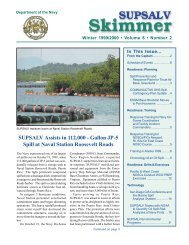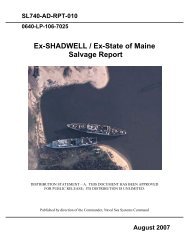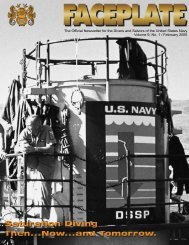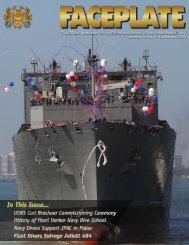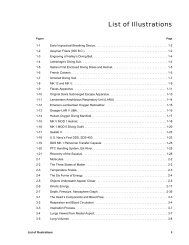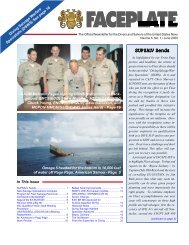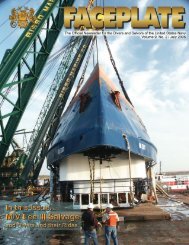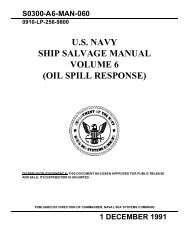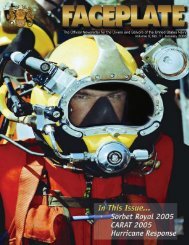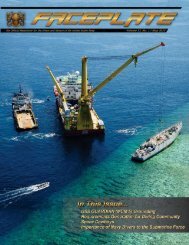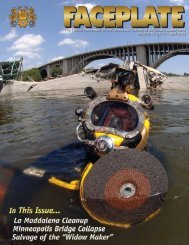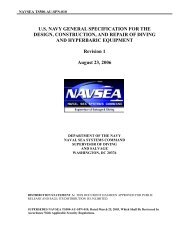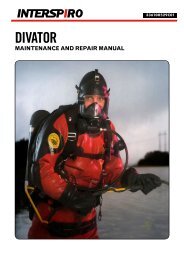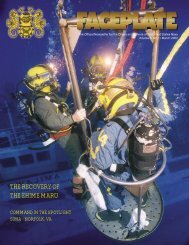U.S. NAVY SALVAGE REPORT DEEPWATER HORIZON ... - ESSM
U.S. NAVY SALVAGE REPORT DEEPWATER HORIZON ... - ESSM
U.S. NAVY SALVAGE REPORT DEEPWATER HORIZON ... - ESSM
You also want an ePaper? Increase the reach of your titles
YUMPU automatically turns print PDFs into web optimized ePapers that Google loves.
Deepwater Horizon Oil Spill Response<br />
Chapter 7 - Lessons Learned<br />
The following Lessons Learned were generated by SUPSALV government staff after the<br />
conclusion of the operation. Internal <strong>ESSM</strong> lessons learned are identified in the <strong>ESSM</strong><br />
Operation Report, Appendix A.<br />
7-1 OPERATIONS<br />
• Near Shore Skimming Operations - Poor communication between Task Force leaders<br />
and SUPSALV , resulting in a lack of operational control of assets:<br />
o<br />
o<br />
o<br />
o<br />
Task Force Commanders continually tried to deploy MARCO Class V skimmers<br />
beyond their sea keeping ability or transit speed limitations to return for crew rest.<br />
An Oil Transfer Bladder was torn during offloading due to mishandling when<br />
SUPSALV personnel were not present. Task Forces were trained in the use of<br />
offloading systems by SUPSALV but no trained personnel stayed in place longer<br />
than 1-2 weeks.<br />
MARCO Class V skimmers are more effective skimming, as designed, in a “V”<br />
boom configuration vice the “free skimming” or even scouting mode often ordered<br />
by Task Force leaders.<br />
SUPSALV operators used their personal cell phones to communicate their<br />
locations and Task Force assignments to SUPSALV managers. There was no<br />
formal communication plan that included SUPSALV at the IC level.<br />
Recommend distributing Operation Guides (CONOPS) upfront to entire Chain of<br />
Operational Command. Also recommend Task Force Leaders not be given control of<br />
SUPSALV equipment without the requirement to work with SUPSALV personnel in<br />
deciding deployment strategy of the assets. SUPSALV also needs to be included in IC<br />
communication plans during future operations.<br />
• Due to the aforementioned communication issues with Task Forces, recommend a<br />
SUPSALV representative be designated to each Incident Command Post to approve and<br />
track use/transfer of assets and provide valuable technical advice to decision makers.<br />
• Many near-shore skimmers, especially MARCO Class V systems, often traveled long<br />
distances in search of oil, only to be in the wrong place. Offshore VOSS skimmers were<br />
rarely assigned based on the most efficient use of their capability, wasting many hours<br />
searching for oil as well. Recommend mandatory, real time aerial spotting with direct<br />
communication to skimming forces. It is important to use available helicopters to support<br />
clean-up operations vice other interests and that there is a clear communication plan<br />
between skimmers and spotters. Skimming is only as effective as the oil spotting and<br />
communication.<br />
7-1



